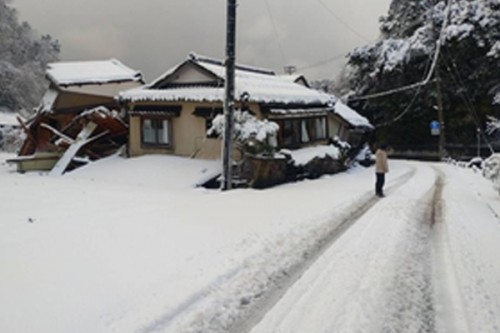Japan quake toll spikes to 202

Tokyo, Jan 9 (IANS) The death toll from a devastating 7.6-magnitude earthquake that struck Japan's Ishikawa prefecture on January 1, increased to 202 on Tuesday, local authorities said.
According to public broadcaster NHK, the temblor, named 2024 Noto Peninsula Earthquake, is the first to kill more than 100 people in the country since the 2016 Kumamoto tremors in Japan's southwestern region, which claimed 276 lives, reports Xinhua news agency.
Of the deaths, 81 had been confirmed in Wajima City, 71 in Suzu City, 18 in Anamizu Town, five in Nanao City, two each in the towns of Noto and Shika, and one in Hakui City,NHK said.
Meanwhile, at least 565 people in Ishikawa suffered injuries due to the quakes, while more than 320 others remain unaccounted for, the public broadcaster said.
As of Tuesday, the Noto Peninsula in Ishikawa prefecture has recorded 1,248 tremors rated at least 1 on the country's seven-point seismic intensity scale since the January 1 earthquake, according to NHK.
The Japan Meteorological Agency (JMA) warned on Monday that quake-stricken areas are likely to experience powerful tremors with an intensity of upper five or more on the Japanese scale in the coming month.
JMA official Shinya Tsukada told reporters that a quake as powerful as the 7.6-magnitude one on Jan. 1 is less likely to take place, but there is continued seismic activity.
Tsukada warned of increased risk of building collapses and landslides, calling on people not to enter dangerous places when engaging in recovery efforts.
Prime Minister Fumio Kishida said that 500 people could be temporarily housed in a sports centre in Kanazawa but said more evacuation centers were needed, adding that the government was also working to find hotel rooms for evacuees.
Meanwhile, a cold air mass has been bringing snow to Ishikawa prefecture and other parts of the Hokuriku region as well as Niigata prefecture, according to the JMA.
Snow accumulation in cities in the Noto Peninsula area had reached about 10 cm late Monday.
The snowfall is also delaying rescue and recovery efforts there.
The weather agency urged people in the disaster-hit areas to take extra caution with the quake-damaged buildings, which could collapse under the weight of snow, and to stay warm to prevent hypothermia amid severe cold.

|

|

